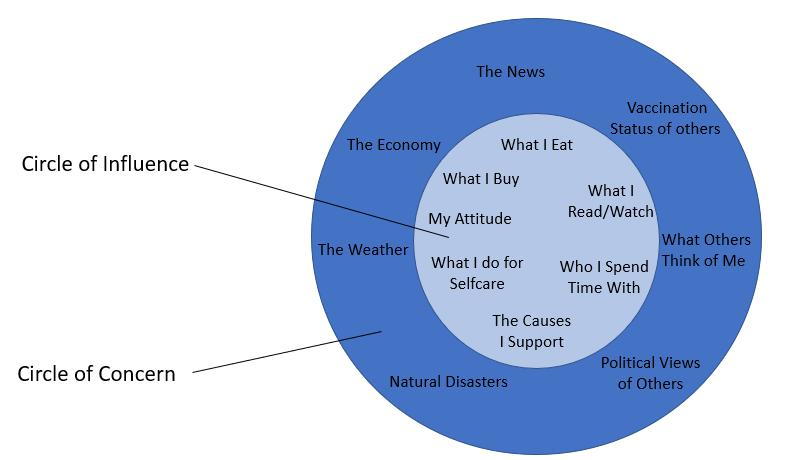
In our first installment on the Five Thieves of Happiness, I introduced the five critical thought patterns that prevent us from living a joyful life. These are destructive thought patterns that cause us to stand in the way of our happiness and prevent us from leading a fulfilled life. They’re known as the Five Thieves of Happiness.
Dr. Izzo, who coined the term “Five Thieves of Happiness,” argues that to find true joy, we need to learn how to identify and “lockout” these thieves by rebuilding our thought patterns and living a more thoughtful, compassionate, and happier life.
As a quick reminder, the Five Thieves of Happiness (sometimes referred to as the 5 C’s) are control, conceit, comparison (or coveting), consumption, and comfort.
Is Your Need for Control Disrupting Your Happiness?
“Happiness is knowing what we can control and accepting what we cannot.” - Dr. John Izzo
As a leadership coach, I work with many clients who self-identify as “control freaks”—I too consider myself to be one.
If you self-identify as a control freak, you probably already know the negative side effects. It has adverse effects on our physical and mental health, causes copious amounts of stress, and likely adds unnecessary friction to our relationships.
This insatiable need for control can apply to many aspects of our lives, including our jobs, families, personal relationships, health, and more. Sometimes, we even try to control other people—whether to help them, or “fix” them, or for many different reasons.
But some things in life are outside of our control, and there’s no way to fix the outcome, no matter how hard we try. And if your happiness depends on those outcomes? Well, you’ll probably find that you’re not experiencing much joy in your day-to-day life.
Experiencing true happiness and joy requires losing a bit of control.
Surrendering Control
It is impossible to control every single aspect of your life. By attempting to do that, you’re only setting yourself up for failure. But giving up control can be really, really hard. You might see it as giving up or find yourself incapable of letting go of whatever it is that’s got a hold on you. Many of us may feel hopeless, anxious, and off-balance when we loosen our grasp on the enormous amount of factors we try to manage every day.
The Circle of Influence is helpful in identifying areas you can and cannot control. Simply make two circles, one inside the other. Write in the inner circle those things you CAN control (circle of influence) and in the outer circle, those things you cannot directly control (circle of concern). Focus your thoughts and actions on the inner circle. Over time, you may find greater peace as you focus on those areas of your life you can control.
Below is a sample of what my Circle of Influence looks like. How does yours compare?

Learning to Let Go
“Save your strength for things that you can change; forgive the ones you can’t. You gotta let it go.” – Zac Brown Band
I recently started volunteering once a week at a local animal sanctuary. Initially, I had planned to volunteer in the Animal Care Center. I lasted less than four minutes on the job.
What I hadn’t accounted for when signing up as a volunteer was that my allergies prevented me from being anywhere near the animals in the sanctuary. So, I was reassigned to work in the gift shop. Although I was still volunteering, I felt like a failure. I was irritated that I couldn’t help out the way I wanted and frustrated that I couldn’t work directly with the animals.
But then a strange thing happened: I started to realize that my new volunteer gig in the gift shop was a much better use of my natural skills (helping others, talking to people, encouraging donations) than my original role. This realization helped me get over my initial feelings of failure, indirectly caused by the sense of control I lost when I was moved to a different role. I had to learn to go with the flow, and now I get to contribute to a meaningful cause while also practicing some much-needed surrendering! Additionally, I try to use my volunteer sessions as an opportunity to practice living in the moment. Whether I’m mopping the floor, tagging merchandise, or helping a child find the perfect souvenir, I am 100% in the moment. I even leave my phone in the back room and take off all my wearable tech to avoid distractions.
How to let go?
Here are some beneficial ways you can practice surrendering control and living life in the present:
1. Practice mindfulness
Mindfulness is one of the most important practices you can incorporate into your life when learning to surrender control. Our brains get fatigued when we’re living in a constant state of control, and mindfulness is an excellent way to help us recapture some of that energy and redirect negative thought patterns. A common misconception is that meditation and mindfulness are the same thing—meditation is a mindful practice, but there are other ways to live mindfully.
Mindfulness might look like this:
- Eating a delicious meal slowly, one bite at a time, so you can truly savor it.
- Breathing deeply for 60 seconds.
- Leaving your phone at home and going on a long walk.
- Taking a yin yoga class and practicing mindful movement.
And, of course, meditation. I started a daily practice in Transcendental Meditation in June 2019 and have found that daily practice has had the most impact in my control tendencies. There are many other types of meditation and finding one that works for you is key - many find using an app like Calm or Headspace can be helpful.
To practice mindfulness, you need to practice observing the present moment and letting your judgments, worries, and stressors pass you by. It’s a lifelong practice that may be difficult, especially if it’s new for you. Still, studies have shown over time, it changes neuro-connectivity in your brain, leading to a more calm feeling long after the moment.
2. Loosen up your expectations
Many times, we try to control things because we attach ourselves to a specific result. When you loosen up your expectations and learn to accept that we’ll be okay no matter the outcome, we free ourselves up to new possibilities. You don’t have to micromanage your entire life. This rigidity prevents you from experiencing the beautiful things life has to offer, even when it throws a wrench in your plans.
3. Find freedom
Letting go can feel a lot like freedom. Allowing things to happen to us instead of orchestrating what happens around us is freeing. Controlling everything at once is like frantically trying to paddle upstream—you’re expending a lot of energy but probably not getting very far. Stop resisting and free yourself up to possibility. (When I feel myself becoming a control freak, I listen to one of my favorite happy songs, ‘Hawaiian Rollercoaster Ride’ and inevitably I remember to lighten up a bit.)
4. Learn forgiveness
Getting stuck on past mistakes can prevent you from moving forward in your life. Control is a big part of that—if we don’t achieve the desired outcome, we’ll kick ourselves for not controlling the situation appropriately. When you forgive, whether you’re forgiving yourself or forgiving others, it helps you to let go of the past and move on from whatever it is that’s holding you back.
“Forgiveness is a gift you give yourself.” – Tony Robbins
Being able to let go of control is an incredibly powerful skill to have. If you can find opportunities to relinquish control in your life, even in small ways, you’ll exponentially increase your capacity for joy, happiness, and wonder.
Stay tuned for the next installment in our series on the Five Thieves of Happiness, where we’ll explore the next thief: conceit.
